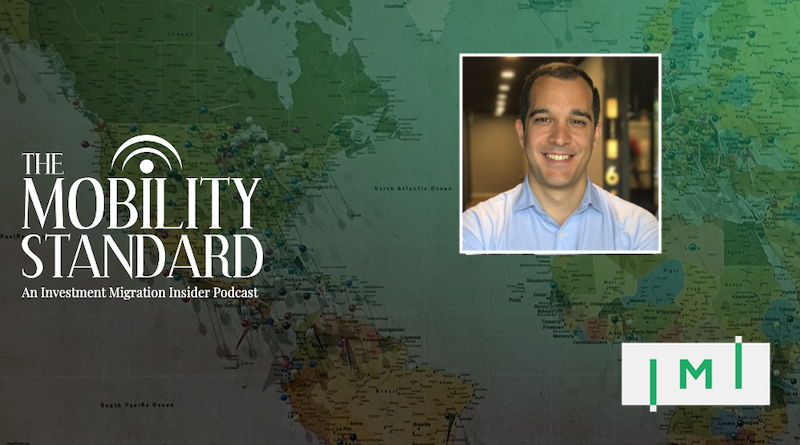Will Next Year’s Price Change Kill Portugal GV’s Fund Investment Category?
In this fourth installment of the Mobility Standard, we spoke to Murat Coskun of Get Golden Visa, a man who’s been closely involved with the Portugal Golden Visa’s fund investment option since the very beginning. We asked him a range of questions about RCBI fund options, including:
- Which investment migration programs out there, beyond Portugal, have a fund option, either explicitly in their regulations or as a hypothetical possibility under their legal frameworks?
- Why don’t any of the Caribbean CIPs have such fund investment options?
- Now that Portugal has decided to raise the minimum investment for the fund category from 350,000 to half a million euros starting next year, will the funds struggle to attract investors?
- In the last several years, only a double-digit number of golden visa investors have picked the fund option, but there are already more than 20 funds available. With such an unfavorable ratio, how can fund managers expect to raise enough capital?
- Portugal has proven that there’s an appetite for investment fund options among investor migrants. Which other programs are likely to take advantage of this market next?
- What are the common pitfalls of fund investment? Which factors should you take into consideration when evaluating a fund?
- What are the tax advantages that fund investment has over real estate?
What will happen to the fund option after the price increase next year?
Christian Nesheim: “Someone I spoke to, who’s big in Portugal’s real estate refurbishment option market, told me very bluntly that Portugal’s fund option is “dead in the water” because it’ll go up to EUR 500,000 [from the current EUR 350,000] next year and that will make it uncompetitive. What’s you answer to that, Murat?”
Murat Coskun: “Now that the price is going up for funds next year, a couple of things will happen. First, we are for sure going to have a very busy 2021. Then, because of the price increase, there will be a sudden drop in demand for the fund option at the beginning of 2022, yes, but there will still be demand.”
That demand, Coskun specifies, will remain because of the many inherent advantages that funds have over real estate:
- They are a completely passive investment, rather than a property that must be visited or managed by the investors, something that’s been complicated by the pandemic.
- They offer a number of tax advantages of real estate: Little to no capital gains tax upon exit and low roundtrip transaction costs.
- The rise of American applicants, who are much more used to financial instruments than investors with a shorter history of public markets, will serve to bolster interest in the fund option.
“With the new geographical restrictions on the real estate options coming next year, more investors will opt for the fund option.”
Coskun highlights that the investment fund option has grown from a mere seven applications in 2019 to 48 in 2020 and that there were 18 in the first three months of 2021 alone, and says he expects the total at the end of 2021 will far surpass the 2020 total.
But even if the number of applicants that pick the fund option triples in 2021, those 150-ish investors will have to be split among 20 different funds. How can fund managers expect to raise enough capital?
Coskun concedes that such an unfavorable ratio will spell trouble for some funds and points out that, for precisely that reason, vetting will be crucial.
“There is no doubt that the changes will leave some of the newer funds quite exposed. Some of those will have a tough time raising funds and we may see some of them drop out of the race completely. That means you need to vet the funds when you are investing today so that you’re not left with a dying fund come 2022.”
Since vetting will be so important, what factors should investors place the most weight on when evaluating a fund?
“First and foremost, look at what the fund focuses on,” Coskun says. “What business sectors, what type of assets, what type of business strategy is it going for. Is it going for startups in healthcare? Is it going for real estate? If real estate, is it only Portuguese real estate? Is it focusing on commercial or residential assets? It’s important to know the fund’s investment philosophy. Once you have a good idea of that, the next question is who are the fund managers? Who are they and what is their track record?”
Coskun also cautions people to check whether the people sponsoring the fund are real estate developers. If they are, he says, they might merely be using the fund to sell its own overpriced real estate.
Listen to the full episode to learn more.
Christian Henrik Nesheim is the founder and editor of Investment Migration Insider, the #1 magazine – online or offline – for residency and citizenship by investment. He is an internationally recognized expert, speaker, documentary producer, and writer on the subject of investment migration, whose work is cited in the Economist, Bloomberg, Fortune, Forbes, Newsweek, and Business Insider. Norwegian by birth, Christian has spent the last 16 years in the United States, China, Spain, and Portugal.



